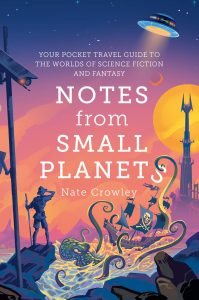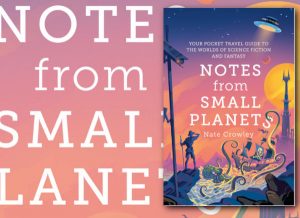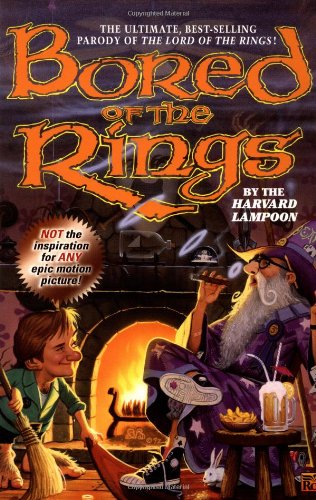NOTES FROM SMALL PLANETS by Nate Crowley (BOOK REVIEW)
 Sci-fi and fantasy love to be epic. There’s nothing like an existential threat to the world or galaxy whose resolution inevitably comes down to a handful of plucky heroes rising up to the challenge of destiny.
Sci-fi and fantasy love to be epic. There’s nothing like an existential threat to the world or galaxy whose resolution inevitably comes down to a handful of plucky heroes rising up to the challenge of destiny.
However, no genre should ever take itself too seriously (Knives Out for murder mysteries anyone?) Speculative fiction’s epically inflated majesty is certainly ripe for a bit of puncturing, but the marriage of high fantasy and comedy has not always been a happy one.
With Notes from Small Planets, Crowley has brought a fresh and amusing take to the sub-sub-genre of parodic homage, finding new ways to illuminate the inherent absurdities within the tropes and triumphs of fantasy and sci-fi. This handy travel guide builds on the solid foundations of its predecessors, but differs in style and substance, as it pokes fun at spec-fic’s most sacred cows.
As a teenager freshly inducted into the grandeur of Tolkien’s Lord of the Rings, I felt a terrible guilty pleasure in The Harvard Lampoon’s Bored of the Rings which brilliantly filleted everything that was magnificent about Tolkien’s trilogy, turning world and characters on their heads. However, sustaining an entire plot recast in the mould of parody is a tricky task that demands much of both the original source and the parody-er. Michael Gerber’s Barry Trotter and the Shameless Parody pushed the limits (plumbed the depths?) of this style of literary satire.
Diana Wynne Jones in her Tough Guide to Fantasyland took more of a travelogue approach, enabling her to pepper the icons of fantasy with a scrupulously alphabetically organised scatter gun. Wynne-Jones highlighted some issues of verisimilitude – not least the species of inexhaustible fantasy horse, sustaining a gallop not just for minutes or hours, but days at a time – as ineffably reliable as a Volkswagen beetle in the aftermath of an apocalypse.
 Crowley brilliantly marries aspects of Wynne-Jones travelogue with Nation Lampoon’s parody, in a work which manages to sustain its fresh vitality by choosing to attack ever spec-fic icon in its modest 250 pages.
Crowley brilliantly marries aspects of Wynne-Jones travelogue with Nation Lampoon’s parody, in a work which manages to sustain its fresh vitality by choosing to attack ever spec-fic icon in its modest 250 pages.
The book presents itself as a partially completed Travel Guide to the recently realised multiplicity of worlds that earth bound tourists can now visit. Our guide is the rather unreliable (and mysteriously disappeared) Floyd Watt who is restrained to a degree by the conscience of his editor Eliza Salt (also mysteriously disappeared). Their interactions season the text through some testy footnote exchanges as we are given Floyd’s insights into the first eight or so of the infinite worlds.
Each paradigm within spec-fic’s imagination is presented as one of these worlds to which Floyd devotes a section of observation, assertion and occasional self-aggrandisement. Each “world” features a range of regions cultures and histories that the reader can enjoy mapping onto the appropriate fantasy milieu. For example, the region Fysteros in the world of Mittelvelde is fairly obvious as an avatar for Westeros before even reading Floyd’s biting summary
“A grim, dark land… whose inhabitants spend all their time squabbling over a metal chair.”
Epic high fantasy, urban superheroes, pirates (dead and undead), steampunk, space (in all its manifestations), barbaric Conans, the Potterverse, and all forms of post-apocalyptic dystopia pass through Floyd (Crowley’s) acerbic sights and are duly skewered.
Crowley stays true to the conceit of his travelogue structure with repeating sections on “people,” “planning your trip,” “currency” and panels of testimonials from happy tourists among others and it works well.
The one point where the nature of travelogues and comedy does this book a disservice is that such a structure invites a reader to dip in and out, sampling the text. However, as a dutiful reviewer, I read it cover to cover in page order and those who eschew such an approach would miss out on a lot of what this book has to offer.
The late great Terry Pratchett had a gift for inserting the mundane realities of our world into a fantastic environment as well as skewering some of fantasy’s own sacred cows (who can forget Cohen the Barbarian?) Crowley too has a story thread running through his travelogue, one he fesses up to in his afterword setting out how Floyd and Eliza are more than just marginally squabbling colleagues.
And that got me thinking about how fantasy, like all literature, is both a product and a reflection of its time. Crowley highlights some of the narrative, thematic and social flaws in fantasy and sci-fi – issues of representation, of high fantasy’s fondness for benign despots, of dystopia’s hunger for revolutions without mapping out any solutions as to what will replace the toppled dictatorship. Which is not to say that these stories should not be enjoyed. It is just that, much as The Tough Guide to Fantasyland highlighted the issues of a lack of setting-appropriate realism or plot diversity in Fantasy, Notes from a Small Planet, goes further in taking discrete aim at some of the outdated societal conventions of speculative fiction.
Which is not to say this is a serious book. It’s a funny well-judged romp through all the most recognisable tropes of our world(s). If, like me, you just love finding references to ideas and other works buried in a text, then Crowley’s work will prove an embarrassment of riches.
However, like all good satire, Crowley finds humour is an effective way to speak truth to power. That people are at their most receptive to something new just after a good laugh. You find yourself laughing, but yeah – he’s got a point. (Or was that just my misguided strategy in work meetings, crack a joke just before making a request.) At the same time as Notes from Small Planets hits the bookshelves, the publishers of D&D have decided to revise the games’ depiction of inherently evil races to something more in tune with the modern reality that good and evil are made by individual choices not birthrights of DNA.
And that is good, because society and literature mature hand in hand. Speculative fiction is not isolated from that perpetual shift, in fact it should be the driving force behind it. A fact that Crowley celebrates just as much as he satirises.
Notes from Small Planets comes out from Harper Voyager on the 17th of September.



